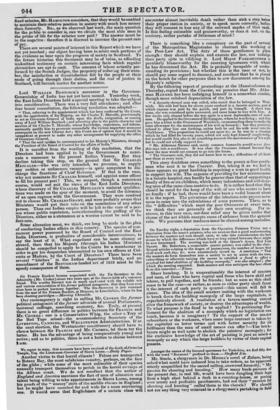There is something like a conspiracy on the part of
several of the Metropolitan Magistrates to obstruct the working of the Poor-Law Act. The duty of these gentlemen is plain enough : they should explain and execute the law, not indulge their party spite in vilifying it. Lord Mayor FAREBROTHER peculiarly blameworthy for the sneering ignorance with which he has denounced the Act. He is probably incapable of under- standing its provisions; but whether this is the case or not, he should pay some regard to decency, and recollect that be is placed on the bench for other purposes than to sow discontent among his Majesty's subjects.
By the following report of proceedings at the Mansionbouse on Thursday, copied from the Courier, we perceive that Mr. Alder- man HARMER has been indulging himself in a somewhat similar, though more subdued depreciation of the, law.
"A decently-dressed man was called, who stated that he belonged to Wool- wich. His wife had been for eleven years confined in a lunatic asylum, part of which expense was paid by the parish, and part by himself. A short time since, she was considered quite recovered, and came home to live with him. A few weeks only elapsed before she was again in a most deplorable state of mad- ness. He applied to the Overseers of Bisbopsgate, where he was hiving; and they gave him a letter to the Overseers of Woolwich, recommending them to make tile same allowance for the maintenance of his wife as formerly : but they positively refused to allow him one farthing, unless both be and his wife went into We Workhouse. This proposition he could not agree to; as he was in a idtuatioa which he had filled for twenty years, which not only kept himself comfortably, but would enable him also to do something towards the maintenance 41 his wife, but he could not wholly support her. " Mr. Alderman Harmer said, surely common humanity would ncrer film this man into a workhouse. It was clear the Overseers refused because they knew the man would not consent to go into the house.
" The Overseers said, they did not know how to act ; difficulties of all kin& met them at every turn."
This story doubtless owes something to the penny-a-line gentle- man who sent it to the Courier. But, taking it as we find it, there appears no great hardship in requiring a man in good health to support his wife. The expense of providing for her maintenance in a lunatic hospital, can hardly be greater than that of supporting a family of five or six children, which many industrious and self-deny- ing men of the same class contrive to do. It is rather hard that they should be rated for the keep of the wife of one who seems to have no family : if be had, there would have been a woful lament about it in the report. The privations of the laborious rate-payers never seem to enter into the calculations of some persons. Then, as to the " difficulties" which meet the poor Overseers at every turn, we think they are generally of their own creating. For in- stance, in this very case, out-door relief may be given under that clause of the act which excepts cases cf sickness from the general rule. We presume that madness must be classed among maladies.


















 Previous page
Previous page